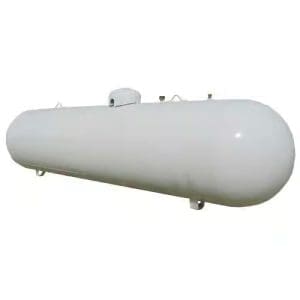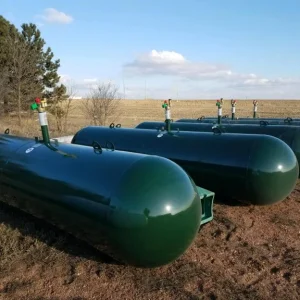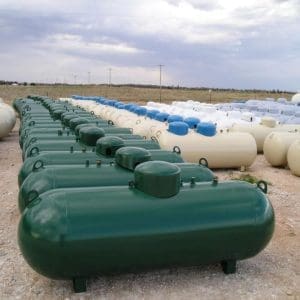Propane tanks are critical in powering various applications in energy solutions, ranging from residential heating systems to commercial generators. They are an integral part of consumer and industry professionals’ energy infrastructure. A common question is about the weight of a 250 gallon propane tank.
Many users choose the 250-gallon propane tank. This article explores the details of propane tank weights and provides clear information on their weight and what to consider.
The Basics: Propane and Tank Specifications
To understand how heavy a 250-gallon propane tank is, you first need to know what propane tanks are made of and how they are built. The weight of a propane tank depends on two main factors. First, the tank’s weight is known as the tare weight. Second, the propane’s weight is inside when the tank is full. These factors are crucial for energy planning or management, affecting transportation, installation, and usage.
Related Products
-
1000 Gallon Above Ground Propane Tank
Original price was: $7,000.00.$5,000.00Current price is: $5,000.00. -
1000 gallon propane tank for sale (Underground)
Original price was: $5,500.00.$4,200.00Current price is: $4,200.00. -
500 gallon propane tank for sale
Original price was: $2,000.00.$1,600.00Current price is: $1,600.00.
Structure and Design of Propane Tanks
Because propane is volatile, tanks are designed to be strong and safe. Typically constructed from heavy-duty steel or aluminum, these materials significantly add to the tank’s overall weight. A 250-gallon propane tank is often used in homes. It provides heat and serves as fuel for generators. The robust design ensures the tanks can withstand various environmental conditions and maintain structural integrity over time.
Propane tanks have safety features like pressure relief valves, essential for preventing accidents. They are also built to adhere to rigorous industry standards, ensuring they can safely contain propane under high pressure. The choice of materials and building methods balances safety, durability, and cost. This makes propane tanks reliable for storing and supplying energy.
The Role of Propane in Energy Solutions
Propane is a versatile hydrocarbon gas with many applications, including cooking, heating, and powering vehicles and generators. Its efficiency and clean-burning qualities make it a good alternative energy source, especially where other energy options are more complicated or more expensive. Propane’s ability to burn cleanly reduces environmental impact by minimizing emissions, making it a favored choice for environmentally conscious consumers and businesses.
Beyond its environmental benefits, propane’s reliability as an energy source is another key factor in its widespread use. It remains effective even in extreme weather conditions, providing a consistent energy supply when other sources may fail. Propane is reliable, has a long shelf life, and is easy to transport. These qualities make it an excellent choice for both cities and rural areas. It helps meet energy needs efficiently and sustainably.
How Much Does a 250 Gallon Propane Tank Weigh?
Consider the weight of a 250-gallon propane tank, empty and full. Both weights are essential for planning and safety.
Tare Weight (Empty Weight)
The tare weight of a 250-gallon propane tank typically ranges from 483 to 600 pounds. This variance is attributed to differences in manufacturing processes, materials, and design specifications. Tanks made with thicker steel may weigh more. However, they also provide better durability and resist environmental stress. Understanding these differences is crucial for making informed decisions about which tank best suits your specific needs.
When considering the tare weight, it’s also essential to consider the implications for transportation and installation. Heavier tanks may need special equipment and more workers to move and set up, which could raise the initial installation costs. The extra weight often means better durability and a longer life. This can lead to long-term benefits that outweigh the initial issues.
Full Weight
To determine the full weight of a 250-gallon propane tank, you need to add the weight of the propane it holds. A gallon of propane weighs approximately 4.24 pounds. Therefore, a filled 250-gallon tank would contain 1,060 pounds of propane (250 gallons x 4.24 pounds/gallon). This brings the total weight of a full tank to approximately 1,543 to 1,660 pounds, depending on the tare weight of the tank itself.
The full weight is a critical factor for Storage and structural considerations. Buildings or platforms that support these tanks must be designed to handle the maximum weight safely. Knowing the total weight is also essential for transport logistics. This helps delivery vehicles carry the load safely without damage or risks.
Comparisons with Other Propane Tank Sizes
Knowing the weight differences of propane tanks can be very helpful when comparing tank sizes. This knowledge can affect costs and logistics.
120 Gallon Propane Tank
A 120-gallon propane tank is often used for home heating and smaller jobs. Its size and weight make it easier to handle. This tank’s tare weight is approximately 212 pounds. When filled, its weight increases by about 508 pounds of propane, bringing the total to around 720 pounds. This size is perfect for tiny homes or places that need propane for specific uses. It offers a good balance between capacity and easy handling.
Choosing a 120-gallon tank can save money. It usually needs less material and is easier to move and set up. It is a practical option for homeowners who need a reliable energy source without a large Storage capacity. Additionally, the smaller size means less frequent refilling, which can be more convenient for those with moderate energy needs.
500 Gallon Propane Tank
The 500-gallon propane tank is more suitable for larger homes or small businesses with higher energy demands. Its empty weight is approximately 949 pounds, and when filled, it holds roughly 2,120 pounds of propane, making the total weight around 3,069 pounds. This larger capacity means a longer supply time. It reduces how often you need to refill and gives a steady energy supply for significant needs.
For businesses or larger households, the 500-gallon tank is a great choice. It can handle more energy use without needing several smaller tanks. It also offers a cost-effective solution over time. The more significant initial investment is balanced by lower logistical and operational costs from less frequent refilling.
1,000 Gallon Propane Tank
These tanks are designed for commercial applications or large residential properties that require significant energy resources. The tare weight is approximately 1,750 pounds, and it holds about 4,240 pounds of propane, totaling 5,990 pounds when complete. Such a large capacity is ideal for operations that cannot afford interruptions in their energy supply, offering substantial reserves that ensure continuous operation.
Choosing a 1,000-gallon tank should depend on your energy needs and available space. These tanks take up a lot of room. However, for those who can use them, they offer great convenience and efficiency. They make sure energy needs are met without any problems.
Practical Applications: 250 Gallon Propane Tank for Generators
A 250-gallon propane tank is excellent for fueling generators. This is especially true in areas with power outages or for people living off-grid. The tank holds enough fuel to keep things running, meaning fewer refills and less worry during extended power outages.
Benefits of Propane for Generators
Propane offers several advantages over other fuel types when used for generators:
- Efficiency: Propane burns cleanly, reducing emissions and ensuring efficient energy conversion. This benefits the environment and enhances the generator’s lifespan and performance, reducing maintenance needs and associated costs.
- Longevity: Unlike gasoline, propane does not degrade over time, making it a stable long-term fuel option. This stability ensures that propane remains effective even after prolonged Storage, providing reliability when needed.
- Convenience: Propane tanks can be easily refilled or replaced, ensuring a seamless energy supply for extended periods. This convenience is particularly valuable in remote areas where fuel delivery might be less frequent, allowing for uninterrupted power even in challenging conditions.
Cost Considerations: How Much is a 250 Gallon Propane Tank?
The price of a 250-gallon propane tank can vary greatly. This depends on factors like the maker, material, and whether the tank is new or used. A new 250-gallon propane tank usually costs between $500 and $1,000, which is a significant energy investment.
Additional Costs
When budgeting for a propane tank, it’s essential to consider additional costs beyond the initial purchase price:
- Installation: Professional installation costs between $100 and $500, depending on the specific site and the complexity of the setup. Proper installation is crucial for safety and efficiency, making it a worthwhile investment.
- Maintenance: Regular inspections are necessary to ensure safety and optimal performance. Budgeting for these ongoing expenses is essential to maximizing the tank’s lifespan and reliability.
- Propane Supply: Propane prices fluctuate based on market conditions and geographic location. To ensure affordability over time, it’s essential to factor in these variable costs when planning your energy budget.
Safety and Maintenance
Safety is of the utmost importance when dealing with propane tanks. Regular inspections and following safety guidelines are essential. They help prevent leaks or accidents, ensuring propane is used safely as an energy source.
Safety Tips
- Regular Inspections: Schedule routine inspections to check for signs of wear or leaks. Early detection of potential issues can prevent accidents and prolong the tank’s life.
- Proper Storage: Ensure tanks are stored in well-ventilated areas away from direct sunlight and heat sources. Proper Storage conditions minimize the risk of pressure buildup and potential hazards.
- Emergency Preparedness: Familiarize yourself with emergency procedures in case of a leak or malfunction. Having a clear plan can reduce the impact of incidents and help keep everyone safe.
Conclusion
Understanding the weight and specifications of a 250-gallon propane tank is crucial for making informed decisions regarding energy solutions. Whether you are considering a tank for residential heating, generator fuel, or other applications, comprehensive knowledge of tank weights, costs, and safety considerations can greatly enhance decision-making and ensure efficient, safe energy usage.
Considering these factors, propane tanks can meet your energy needs, keep you safe, and save money. This knowledge helps you pick the right tank for your needs. It also lets you enjoy propane as a reliable and sustainable energy source.





